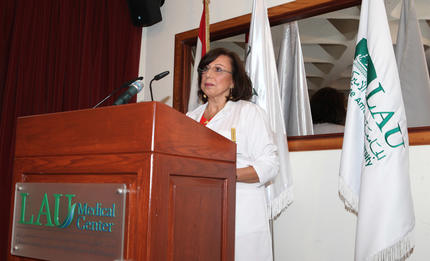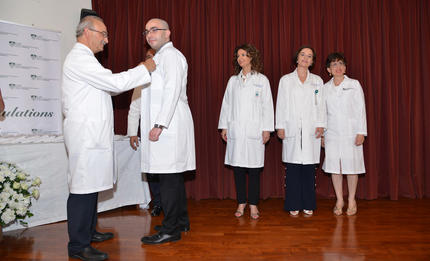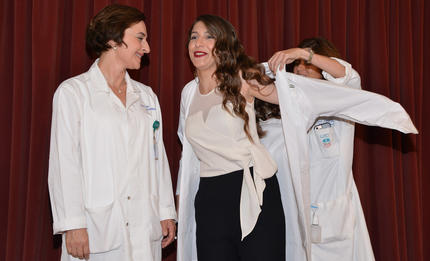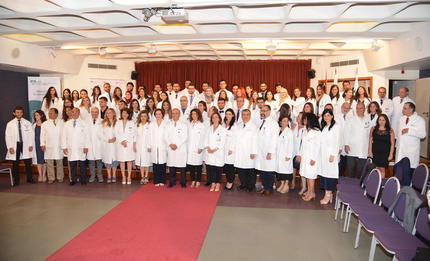Medical students earn their white coats
With reminders of their profession’s cardinal rules and words of encouragement, medical students embark on the clinical stage of their studies.

Associate Professor Marie Deeb, master of ceremony, calls the students to the podium to receive their white coat.
More than 50 students of the Gilbert and Rose-Marie Chagoury School of Medicine this summer donned white coats and began the clinical stage of their studies. The rite of passage was held at the LAU Medical Center-Rizk Hospital, during which Dean of the school Michel Mawad bestowed advice on his students.
“Today, we entrust you with this tremendous and serious responsibility of caring for another human being,” said the dean, welcoming the young doctors, before urging them to be considerate of their patient’s fragility, to focus on prevention as well as cure, and keep hope alive. Medicine, he went on to remind them, “is not strictly a science but mostly an art of being a good listener, a good communicator, a confidante, a healer, an advocate and a protector.”
Encouraging the students to believe in their potential, resident Wael Salameh told them to keep in mind that they can rely on the unflagging support of the faculty and staff at LAU. “Your strength lies in your backbone; the faculty, the administration and the staff that continue to work round-the-clock to provide you with learning opportunities … and the institutional growth that caters to your individual needs.”
Also on hand to offer advice was resident Remie Chrabieh, who recalled his enthusiasm at transitioning from classroom to hospital. “I was ready to start learning by doing and was elated to spend my days interacting with and learning from patients, physicians, nurses and ancillary staff,” he said, before emphasizing the importance of practice and collaboration.
Pre-clinical training, an integral part of the students’ education, offers them several opportunities to practice both their medical and collaborative skills at LAU’s simulation center. “Working with manikins and actors, the students learn a lot in their first two years, about communication as well as examination,” explains director of the center Vanda Abi-Raad, also assistant dean for Continuing Medical Education. As developing their skills is ongoing, Med III and Med IV students continue to visit the center during their various clinical rotations. “There are some things you can’t teach them until they’ve observed it in a hospital setting, like how to break bad news, interact with a multidisciplinary team, and work through a crisis,” explains Abi-Raad.
The simulation center is but one of the strengths of the LAU medical program, explains Zeinat Hijazi, associate dean for Medical Education. “Our curriculum is very special. During instruction in the basic sciences, we include discussion of clinical conditions that relate to each part or system of the body being studied,” she says, adding that students start every week working in groups to review a clinical scenario. “This problem-based learning improves their critical and analytical thinking.”
Moreover, while the white coat ceremony marks the students’ transition from pre-clinical to clinical learning, the curriculum and school are designed to ensure fluid continuity of learning. Those responsible for student development during the pre-clinical years, among them Hijazi, serve on clinical committees. Similarly, those responsible for clinical learning at the hospital, including Assistant Dean for Clinical Affairs Sola Bahous, teach pre-clinical classes and are engaged in the development of the curriculum.
Bahous believes the success of this approach, which focuses simultaneously and continuously on the development of knowledge, skills and behavior in the pre-clinical years and thereafter, is evident in the confidence and preparedness of the Med III students. “They are ready for a challenge and knowledgeable, though somewhat apprehensive about their first patient interactions.” With the support of their training, their professors and the simulation center, they soon overcome their fears and “feel like doctors, taking care of patients, and having impact on patient care.”
Ultimately, however, and as Mawad advised the students, their responsibilities as physicians do not end there. “All along your profession, and as you learn the art and science of medicine, you must prepare yourself starting today to become the teacher for future generations.”
More
Latest Stories
- Into the Psychology of Justice
- Alumnus Zak Kassas on Navigation, Spoofing and the Future of GPS
- Hearing Between the Lines
- LAU Hematology Conference 2025: Advancing Science Through Interdisciplinary Exchange
- Dr. Chaouki T. Abdallah Invested as LAU’s 10th President
- LAU Guides Its Students Through the Code of Conduct
- Innovative Procedure at LAU Medical Center–Rizk Hospital Signals Hope for a Patient With a Congenital Disease
- LAU’s Inaugural PodChat Session Addresses AI Detection in the Classroom




